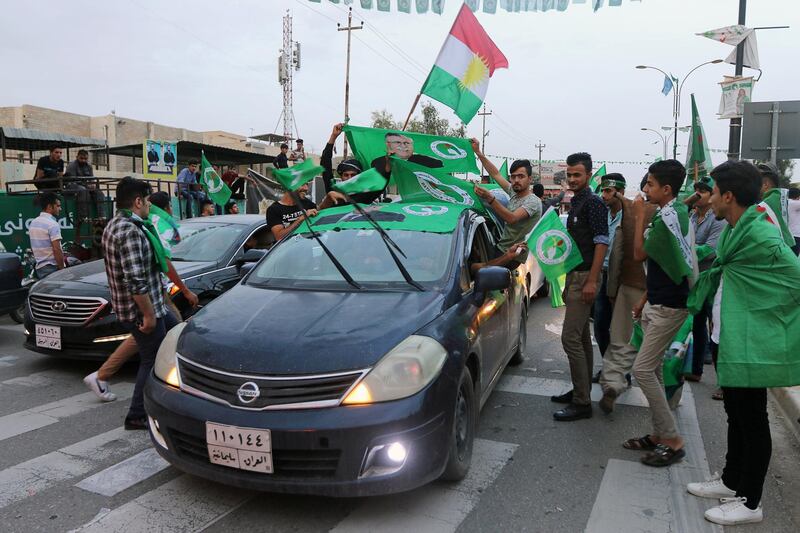Violence erupted in the Kurdish city of Sulaimaniya while demonstrations took place in Kirkuk over allegations of ballot rigging as Iraq awaits election results.
Gunfire broke out on Saturday night between the Patriotic Union of Kurdistan (PUK), the party which historically controls the city, and the Movement for Change, or Gorran.
Hoshyar Ali, Head of Department of Diplomatic Relation for Gorran told The National that the PUK and the Kurdistan Regional Government (KRG) were responsible for the "atrocious" acts against the movement.
"This was premeditated and deliberate attack with heavy weaponry against the leadership of Gorran Movement and activists," Mr Ali said, adding that voting had been rigged in "an absurd manner".
Witnesses on the ground reported the use of heavy machine guns and AK47s by PUK forces.
“Six people have been wounded but an official account has not been announced by hospitals in Sulamaniyah,” Mr Ali said.
Earlier on Saturday, Gorran and three other Kurdish parties accused the PUK of electoral fraud.
Security was tight given the lingering threat from ISIS. One policeman was killed and five wounded by mortar in eastern Iraq, a local official said, but there were no major incidents.
__________
Read more:
Iraq elections 2018: Kirkuk minorities claim voting violations
Iraq elections 2018: First polls since ISIS defeat
Iraq vice president says elections alone will not solve the country’s problems
__________
Voter turnout was 44.52 per cent with 92 per cent of votes counted, the Independent High Electoral Commission (IHEC) said on Sunday.
More than half of the nearly 24.5 million voters did not show up at the ballot box in the parliamentary election, the highest abstention rate since the first multiparty elections in 2005, although it passed off largely peacefully.
It’s significantly lower than previous elections, the results are expected to be announced on Monday.
“This election takes the Kurdish region back to 1992 where the [Kurdish] civil war erupted, Iraq as a whole will suffer from huge setbacks and the elections will become a sham," Mr Ali said.
More than 15 bloody years since the ouster of former dictator Saddam Hussien, there is deep scepticism about the country’s political system dominated by an elite seen as corrupt and sectarian.
PUK officials claimed their party won most of the province's seats in the Iraqi parliamentary elections even though no result was officially released.
In a joint statement the Gorran Movement along with other Kurdish parties rejected the "whole elections process and results" urging for a new election in the KRG and Kirkuk. They demanded a manual recount of the votes.
Just west of Sulaimaniya in the oil-rich city of Kirkuk tensions peaked when the city governor, Rakan Al Jubouri, along with the head of the Turkmen Front, Arshad Al Salehi, demanded a manual recount of the votes, citing technical glitches in the electronic voting machines.
"The security situation in the city is very concerning, there are thousands of Turkmen and Arabs demonstrating outside of the IHEC's main office fearing that their voices are not going to heard," Mr Al Salehi told The National.
“We demand the authorities protect the rights of citizens in Kirkuk,” he said.
In response, the IHEC announced on Sunday that it will send a committee to “investigate the allegations of Arabs and Turkmens in Kirkuk of voter rigging.”
Also on Sunday Prime Minister Haider Al Abadi called for the tightening of security in the north.
Mr Al Abadi ordered the security forces in Kirkuk and other provinces of the Kurdistan Region to tighten control while remaining neutral in affairs related to the election.






